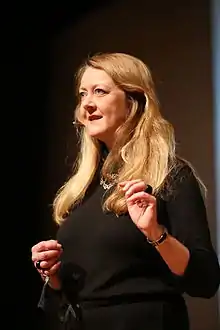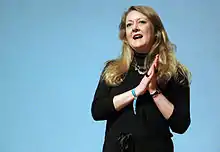Annie Machon
Annie Machon (born 1968) is a former MI5 intelligence officer, a writer and public speaker.

Early life and MI5
The daughter of a pilot turned Guernsey newspaper editor, Machon won a scholarship to a private school and then read Classics at Girton College, Cambridge.[1][2] After her graduation, Machon began a career working for a minor publisher.[3]
In 1990, Machon sat a Foreign Office examination to become a diplomat, but was recruited by MI5 where she was posted to their counter-subversion department, officially known as 'F2'.[4]
One year after joining the service she met David Shayler. Looking for left-wing subversives, she told Stuart Jeffries of The Guardian in 2002, they were reportedly disappointed by the sheer scale of historic investigation of alleged subversive. They prepared summaries from files on anyone standing in the 1992 general election. Many of those people were to become senior politicians within the Labour Party and government after 1997, including those who went to become ministers responsible for overseeing the work of British intelligence services.
She then spent two years working in 'T' Branch, investigating Irish terrorism, before being re-posted to the international counter-terrorist division, known as 'G Branch'.[5]
Resignation and whistleblowing
In October 1996, Machon and Shayler resigned from the service.[1] intending to blow the whistle on a series of alleged crimes committed by the service, such as secret MI5 files held on the very government ministers responsible for overseeing the intelligence services, illegal MI5 phone taps, lying to the government by MI5, IRA bombs that could have been prevented, the 1994 bombing of the Israeli embassy in London, when two innocent people were wrongfully convicted and the attempted Secret Intelligence Service assassination of Colonel Gaddafi of Libya.
Shayler took classified documents to The Mail on Sunday; the first story published on the penultimate Sunday of 24 August 1997, concerned the allegation of widespread spying on so-called subversives including Peter Mandelson, whose telephone had been bugged for three years, and other government ministers. A court injunction prevented claims about what the security services knew about the IRA from being revealed.[6] The couple claimed the British government had been involved in an assassination attempt against Colonel Gaddafi and that the security services had foreknowledge of the 1994 London Israeli Embassy bombing and the IRA's City of London bombing.[1]
After they resigned, Shayler and Machon went on the run around Europe for a month. Machon then returned to London to face arrest but was never charged with any crime. She then returned to France and lived with Shayler in rural France for a year. In July 1998 Shayler worked with BBC Panorama, the Sunday Times, and The Mail on Sunday to reveal what became known as the Gaddafi assassination plot in 1996. Due to British issues and urgent request to extradition under the terms of the Official Secret Act Shayler was imprisoned in Paris for almost 4 months waiting for the hearing. The French declined the extradition on the basis that whistleblowing was a political act. Shayler and Machon lived in Paris for 2 years and then returned to the UK in August 2000 for Shayler to stand the trial.[7]
Shayler was imprisoned for six months in November 2002 for offences contravening the Official Secrets Act. The trial judge said he should thank Machon for helping to quash the claim in her evidence that he had copied secret documents to begin a career in journalism.[8] Machon did not face any criminal action herself.[6]
Later activities

From 2012 to 2016 Annie Machon was the European Director of LEAP, a global group of serving and former police officers, lawyers, judges, intelligence officers, prison governors, customs officers, and former drug czars. LEAP speakers have worked on the front line of the failed "war on drugs" policy, recognize this abject failure, and as a result campaign for an end to drug prohibition. In this role she kick-started new national LEAP groups in the UK and Germany, has spoken in a number of European parliaments, international conferences, and festivals, met with government ministers, government advisers, and drug czars across Europe, represented LEAP four times at the UN Commission on Narcotic Drugs annual event in Vienna, and even appeared in the occasional film – most notably in The Culture High.
She is on the organising committee of the Sam Adams Associates for Integrity in Intelligence, a founding member of the Global Council of the Good Technology Collective, as well as a member of Veterans for Peace UK and the Campaign for Press and Broadcasting Freedom.
She is currently on the board of The Freedom Index Foundation, and also on the advisory board of the Courage Foundation, supporting key whistleblowers such as Edward Snowden.
She has also given evidence to both the European Parliament and the UK Parliament about surveillance in the wake of the Snowden disclosures.
She also appears in The Mole: Undercover in North Korea where her intelligence experience is used in debriefing the principal agents
Bibliography
- Machon, A. (2005). Spies, Lies and Whistleblowers: MI5 and the David Shayler Affair. Book Guild Ltd.; ISBN 1-85776-952-X
References
- Dickson, E. Jane (23 January 1999). "Point of No Return: David Shayler". The Independent. Retrieved 13 March 2018.
- Durrant, Sabine (3 April 2000). "No place to hide". The Guardian. Retrieved 13 March 2018.
- Thomas, Gordon (2009). "Inside British Intelligence: 100 Years of MI5 and MI6". JR Books. p. 209. ISBN 9781907532658.
- Machon, Annie (29 August 2010). "Annie Machon: my so-called life as a spy". The Sunday Telegraph. Retrieved 13 March 2018.
- Jeffries, Stuart (15 November 2002). "The spy who loved me". The Guardian.
- Freeman, Sarah (9 February 2017). "Annie Machon: Forget Hollywood, being a whistleblower is hard work". The Yorkshire Post. Retrieved 13 March 2018.
- "Shayler home to face the music". The Independent. 26 August 2000. Retrieved 13 March 2018.
- "Shayler jailed for six months". The Guardian. 5 November 2002. Retrieved 13 March 2018.
External links
| Wikimedia Commons has media related to Annie Machon. |
- Annie Machon on Consortiumnews
- Annie Machon on RT
- "International speaker", anniemachon.com via archive.org
- Real News interview (first of two parts)